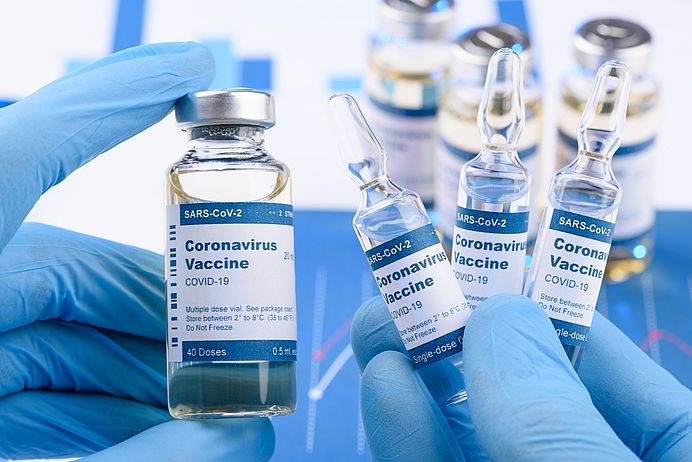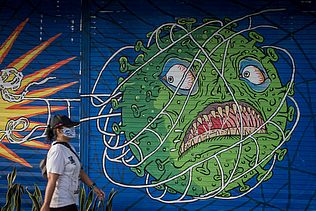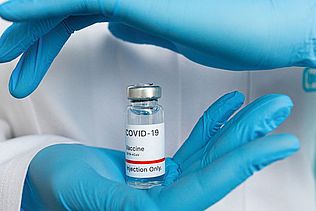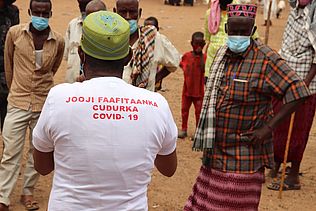By Dr. Andreas Wulf
With Covid-19, the controversy over research, development and availability of essential medicines and vaccines returned: and two crucial international institutions took center stage - the World Health Organization (WHO) and the World Trade Organization (WTO). This blog looks at the global equity debates and initiatives on availability and accessibility of tests, vaccines, and medicines to prevent and treat COVID-19 during and after the pandemic.
The COVID-19 pandemic has brought debates about the ownership and availability of newly developed medicines and vaccines out of the professional circles and into the wider public sphere - thanks in part to the first African Director-General of the World Health Organization (WHO), Dr. Gebreyesus Tedros. He spoke as early as January 2021 of a "catastrophic moral failure" in the face of unequal global access to the life-saving medical products that had just been developed.
This failure magnified over the following two years with each new round of boosters and adapted vaccines (in 2022 to the Omicron variant of the Corona virus), which are primarily available to wealthy countries. By the end of 2022, the number of COVID-19 deaths that could have been prevented in poorer countries through a more equitable global distribution of vaccines was estimated to be 1-1.5 million, out of 20 million Covid19 victims worldwide.
As global attention to the pandemic waned in 2022 and 2023, vaccination rates of 70-90% in countries with their own vaccine production and bilateral agreements continue to contrast with low vaccination rates in most of the poorest countries, which have only just surpassed 32% vaccination rates among the adult population.
Who owns the knowledge?
A key factor in the gap between those who can get vaccinated and those who lose out are the globally granted private property rights to such new inventions- despite the huge government investment in the development of diagnostics, drugs and vaccines against covid-19.
Moderna's mRNA vaccine development was directly funded by the U.S. to the tune of $1 billion; Moderna was also forgiven for $1.8 billion in public basic research patents. Johnson & Johnson's adenovirus vaccine received $1.45 billion in funding. Pfizer/Biontech also received $475 million from the U.S. government and 375 million from the German federal government for vaccine development.
Despite this enormous public funding, the products remain under the control of the manufacturers. This is despite the fact that they are supposed to be "global public goods" and accessible for all - as announced in the spring of 2020 by EU Commission President von der Leyen and prominent heads of state.
The reality was and is different: The mRNA and adenovirus vaccines of the above-mentioned manufacturers from Europe and the USA, which proved to be particularly effective against the severe COVID-19 disease, were already sold in 2020 - months before the first of these vaccines had been approved in the USA, Europe and by the WHO - for the most part via pre-orders to a handful of rich countries.
No wonder that the stock market values of the pharmaceutical multinationals Pfizer, AstraZeneca and Johnson& Johnson subsequently went through the roof, as did those of the German and US development companies Biontech and Moderna. Gigantic profits in the billions were reported for 2021 and 2022.
These enormous profits can only be realized if the knowledge of development and production remains in the hands of a few. To this end, the monopoly position of the manufacturers is secured by the Agreement on Trade Related Aspects of Intellectual Property Rights (TRIPS), adopted globally at the World Trade Organization (WTO) in 1994.
The TRIPS Agreement and the Myth of Intellectual Property Rights as Innovation Drivers
In the 1990s, the pharmaceutical industry, primarily in the USA - (Pfizer was a key player here) - played a decisive role in enforcing this agreement, in addition to the major IT corporations. In view of the catching-up industrial development of important emerging countries such as India, South Korea, Mexico, Brazil and China, the aim was to keep competitors away from innovations for as long as possible, even at the cost of delayed global access to vital products as medicines. The TRIPS agreement was pushed through under massive pressure from the U.S. and obligates all members of the WTO (except the poorest countries) to guarantee, among other things, "minimal" protection of product patents over a 20-year term.
Yet the myths surrounding this "innovation model" of intellectual property rights in pharmaceutical development have long been dispelled: One important justification for this model are the high research costs and numerous failures on the way to new medicines. In fact, however, the large corporations often no longer do any research themselves. Instead, they use their enormous profits for shopping sprees and mergers: Small biotechnology companies that can demonstrate promising research results are swallowed up and relieve the "big players" of the development risks. Or "deals" are negotiated that are profitable for both sides: This was seen in the entry of the US pharmaceutical giant Pfizer into the efficacy testing and production of the mRNA vaccine developed by German company Biontech in April 2020, as well as in the cooperation between the British-Swedish company Astra-Zeneca and the developers of the adenovirus vaccine at Oxford University.
Public research funding and alternatives to the monopoly-based system of drug development
The story of the development of the Covid 19 vaccines, heavily funded by government and public institutions not only in the U.S. and Europe, but also in India, China, Russia, and Cuba, demonstrates once again that public investment is the central lever to rapid success - and precisely not the patent system, which is supposed to subsequently compensate manufacturers for their investment risks in the event of success.
The development of vaccines exposes the myth that patents are the central incentive for the production of new knowledge and new products in a capitalist system. After all, hardly any of the large corporations had invested relevantly in vaccine research in recent years, just as little as in the urgent research into new antibiotics in times of growing antibiotic resistance.
Here, a patent-based research model that rewards the fastest possible maximum sales of the new drugs (before the patent period has expired) is even counterproductive, because novel antibiotics must not be marketed and used most widely, because this is driving rapid development of resistance among pathogens and the associated decline in their effectiveness. [1]
Nevertheless, the global rules of the game grant the final developers of these products a monopoly on them through the patent system, seems to be set in stone despite the global pandemic.
Open knowledge is possible
The alternatives to the monopoly-based development system have long been on the table. What would be needed is a consistent separation of research and development costs from the prices of the drugs produced. However, such a global initiative failed in 2012 at the WHO, although this would be the multilateral actor in global health policy with a mandate to negotiate binding agreements under international law.
As early as 2003, the WHO Commission on Intellectual Property Rights, Innovation and Public Health presented a corresponding report. Based on this report, an expert working group was set up in the following years to develop ideas for financing research and development in the public sector, which was discussed at the World Health Assembly in 2012. It envisaged a binding framework agreement on "Open Knowledge Innovation" to agree on joint public research funding by WHO member states in line with their economic performance. This would put the knowledge generated, the products and even licenses under public control. In this way, medicines could be reproduced cost-effectively by all. This proposal failed because the group of industrialized countries did not want any change in the status quo.
COVID-19: The CTAP initiative and its targeted undermining
The coronavirus pandemic, optimistically, could have been the right opportunity to give new weight to these Open Knowledge concepts. In May 2020, Costa Rica, with the support of WHO and a number of other smaller countries, proposed a Covid-19 Technology Access Patent Pool (CTAP), hosted by WHO, where knowledge about the virus and tools to combat it would be pooled and available to all through a free licensing process. Voluntary licenses, study and approval data, and know-how to accelerate technology transfer should be pooled here and made available for production by other companies with spare capacity and the relevant experience. In this way, the shortage of vaccines could be overcome more quickly and the blockade that has already lasted for a long time could be overcome, at least for the current crisis.
However, the pharmaceutical cartel and its supporters in the governments of the large industrialized countries have outwaited CTAP compleatly. Only 34 small and medium sized countries (from Europe Portugal, Belgium, Norway, Netherlands, Spain, Luxembourg) without a strong pharmaceutical industry have officially supported this initiative. At the height of the pandemic, CTAP was only able to solicit a license for COVID-19 antigen rapid tests from public research institutes from Spain and the US; it was not until August 2023 that the smaller vaccine manufacturer Medigen placed voluntary licenses in the pool.
At the same time, the provision of enormous public funds for research and development to the corporations could have made precisely a binding condition for a Public Return on Public Investment: A commitment to a "socially responsible licensing process," as has long been debated and implemented by some universities and public research institutes. Prof. Christian Drosten from the Institute of Virology at Charité Berlin, for example, who became known in the COVID-19 crisis, has developed a hepatitis C test procedure with his team and made it available as open source.
In Germany, not only the grand coalition that was voted out in 2021, but also the current „traffic light“ government have supported this blockade by the pharmaceutical industry and continue to rely on purely bilateral agreements. For example, AstraZeneca has signed an agreement with South African company Aspen to fill and manufacture its adenovirus vaccine. And Biontech has signed agreements with the governments of Rwanda and Senegal for local manufacturing sites for its mRNA vaccine. They remain unwilling to actually share their knowledge and technologies with anyone who would be capable of production. Even Green Party Co-Chair Robert Habeck, who was still open to changes in the patent regime when he was in opposition, flipped in his new role as Minister of Economics and Vice Chancellor after taking advice from the pharmaceutical lobby, as he quite naively admitted publicly in January 2022.
Patents kill! - The dispute over the suspension of patent rights for COVID-19 vaccines and drugs
Faced with this blockage of voluntary cooperation, India and South Africa brought a request to the WTO in October 2020 for a suspension of the TRIPS agreement on patent protection (TRIPS waiver). Temporary for the current pandemic and limited to medical devices for Covid-19: technical devices, medicines, diagnostics, protective equipment and vaccines. This would allow them to be copied more quickly and cheaply by other manufacturers and reduce the bottlenecks that exist globally, not only for vaccines. Such a waiver would include not just the patents, but also protected knowledge such as approval data, which are important for the rapid production of copycat products (generics).
Such a waiver is a legally possible flexible approach to intellectual property rights within the framework of the TRIPS Agreement. But in the negotiations of the WTO member states on the concrete text of the proposal, which was supported by more than 100 countries, mainly from the Global South, a handful of powerful countries in particular opposed it: the European Commission as the representative of the EU states, including above all Germany, also Switzerland and Great Britain, and most of the OECD states.
Since the fall of 2020, broad civil society campaigns protested against this blockade. In Germany, the "makethemsign" alliance had formed in spring 2021, putting pressure on the federal government with social media activities and "offline" demonstrations. Internationally, there were and are protests in many countries and by the global "People's Vaccine Campaign" which also gets many scientists and celebrities under its calls.
Despite the global pandemic crisis and this great public pressure, it was not until June 2022 that a minimal compromise was reached at the WTO, which no longer deserves the name "waiver" but merely makes the options of compulsory licenses somewhat easier. It was clearly "too little, too late." The shameful blocking role of the European Commission could at least be made partially transparent despite great resistance.
The corporations and wealthy states continue to claim that the patent system secures - not limits - the supply of COVID-19 vaccines. In fact, lifting or suspending patent protection is the only way to control future pandemics.
Pressure on the obstructionists at the WTO must continue, as must pressure on companies to make the tools developed with heavy public funding to curb Covid-19 available to all. The experience with COVID-19 underscores the urgency of taking essential health knowledge away from private monopolies.
[1] McKenna, M. (2020): The antibiotics paradox: why companies can’t afford to create live saving drugs. Nature 584: 338-341.





